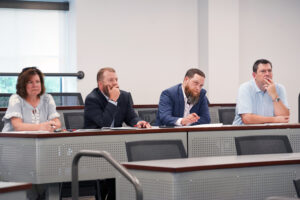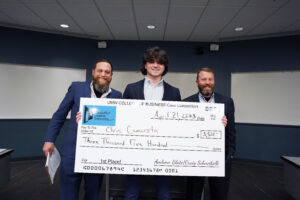[ad_1]
The challenge: Take three separate California-based street-sweeping companies and combine them into one new business with the equipment, personnel, contracts and management to succeed despite potential competition from the biggest player in the industry.

That was the “case” posed in the fifth annual Case Competition, a contest in which teams of UMW business students tackle a business problem, consider obstacles and possible solutions, then present their findings orally and via projected slides. It’s a chance for them to use all their accumulated knowledge and skills, deploy their public speaking powers, and think on their feet to answer judges’ questions.
There’s a monetary reward, too – cash prizes totaling $5,000, sponsored by alumnus Andrew Blate ’04 and business partner Craig Schneibolk of the D.C.-area remodeling company Beautiful Home Services. Blate and Schneibolk started an endowed fund that eventually will cover award money for each year’s event, and they also judged this year’s contest along with fellow business alumni Linda Blakemore ’84 and Rob Whitt ’93.
To make it to this year’s Case Competition – held Friday, April 21, 2023, in the Leigh Frackelton Classroom of Woodard Hall as part of UMW’s 17th annual Research and Creativity Symposium – each of five teams had to win a preliminary competition with fellow students in several business classes. The five teams that competed this year were well-prepared, with carefully researched solutions and polished presentations.

Business student Emma Rolf, right, speaks as teammate Riley Smith waits to add to the presentation for Team 1. Also presenting were team members Hope Wilder and Kyle Garcia. (Suzanne Carr Rossi photo.)

Business student Chris Camarota speaks during his solo presentation as Team 2. (Suzanne Carr Rossi photo.)

The students of Team 3, Kris Schulte, Tyler Ventura, Abigail Atkinson, Jeffrey McLean and Christopher Tugeau, confer after their presentation. (Suzanne Carr Rossi photo.)

Assistant Professor of Business Samira Fallah, left, chats with the students from Team 4, Edenia Benitez and Kate Ramirez. (Suzanne Carr Rossi photo.)

Marcelo Ruggiero and Jane Kisselev, Team 5, react to one of the award announcements. (Suzanne Carr Rossi.)

Judges Linda Blakemore ’84 and Andrew Blate ’04 react to a light moment in one of the presentations. (Suzanne Carr Rossi photo.)

At right, Ken Machande ’94, the College of Business interim dean, tells the competitors, “I’ve seen every presentation in all five years, and this is by far the most professional final group we’ve seen.” (Suzanne Carr Rossi photo.)
But plans can go awry, as Chris Camarota ’23 discovered Friday afternoon, just hours before the competition. A member of Camarota’s team had to withdraw from the presentation, and his other teammates dropped away soon after. Camarota decided to go ahead with the contest, all by himself.
Presenting as Team 2, Camarota drew the judges’ praise for being gutsy enough to go it alone, and for his comprehensive consideration of the case and his comfort in speaking with minimal reference to notes.
But he faced high-quality competition from the other teams:
Team 1, Emma Rolf, Kyle Garcia, Riley Smith and Hope Wilder, each spoke on a specific aspect of the merger. The judges admired their decision to form a holding company for the merger and their handling of the differing union climates of the three companies being combined.
Team 3, Christopher Tugeau, Abigail Atkinson, Kris Schulte, Tyler Ventura and Jeffrey McLean, earned judges’ praise for structuring their presentation with solutions at the beginning and for thoughtful answers to follow-up questions.
Team 4, marketing majors Edenia Benitez and Kate Ramirez, focused their presentation on how to best introduce the new company to the public, considering the overall marketing environment. The judges liked their frankness and humor in answering follow-up questions.
And Team 5, international marketing majors Marcelo Ruggiero and Jane Kisselev, zeroed in on the possibilities of branding the company as an eco-friendly business, using California’s environmental regulations as a market-building advantage. The judges admired their teamwork and easy back-and-forth speaking style.
Presentations over, the judges deliberated in private. Ken Machande ’94, the College of Business interim dean, didn’t envy them the task. “I’ve seen every presentation in all five years,” Machande said, “and this is by far the most professional final group we’ve seen. Every team in here would’ve been in the top three in previous years.”
Before announcing the prize-winners, Blate told the teams he appreciated that they all showed up in proper business attire, came prepared and had the confidence to acknowledge it when they didn’t have the specifics to answer a particular question.
Ultimately, he said, it came down to “razor-thin differences” among the five teams. Coming in third for $500 was Team 5, Ruggiero and Kisselev, and in second for $1,000 was Team 1, Rolf, Garcia, Smith and Wilder.

Then Blate made the top prize announcement: “The winning team was … Chris!”
Camarota had won the $3,500 top prize, solo. And Blate made him promise not to share the winnings with members of his team who didn’t attend the competition. “If you’re not here, you don’t get any money,” Blate said to laughter throughout the room.
But Machande pointed out that everyone participating in the Case Competition gained something of value from the experience.
“What you did tonight is going to benefit you in the future,” he told the competitors. “You were put under pressure, you had a goal, and you met the challenge.”
Related
[ad_2]
Source link
